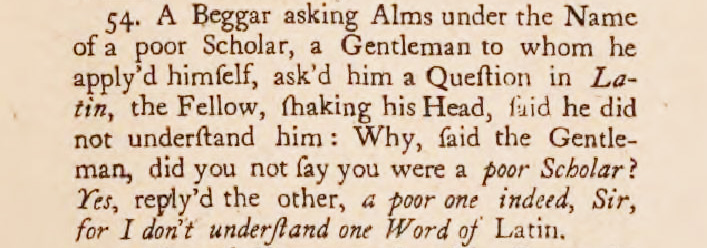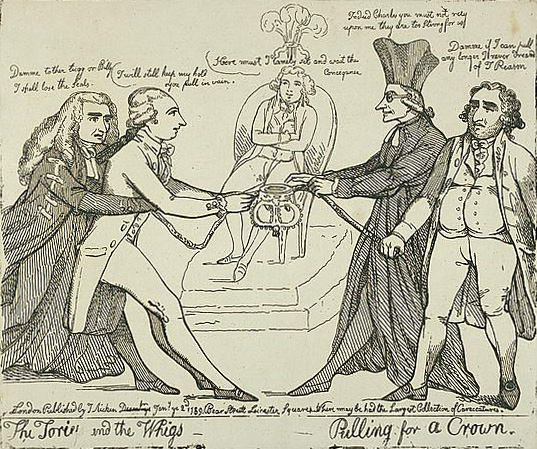The Indiana State Library is home to a number of fascinating items, including an excellent 19th century facsimile of the original “Joe Miller’s Jests.”
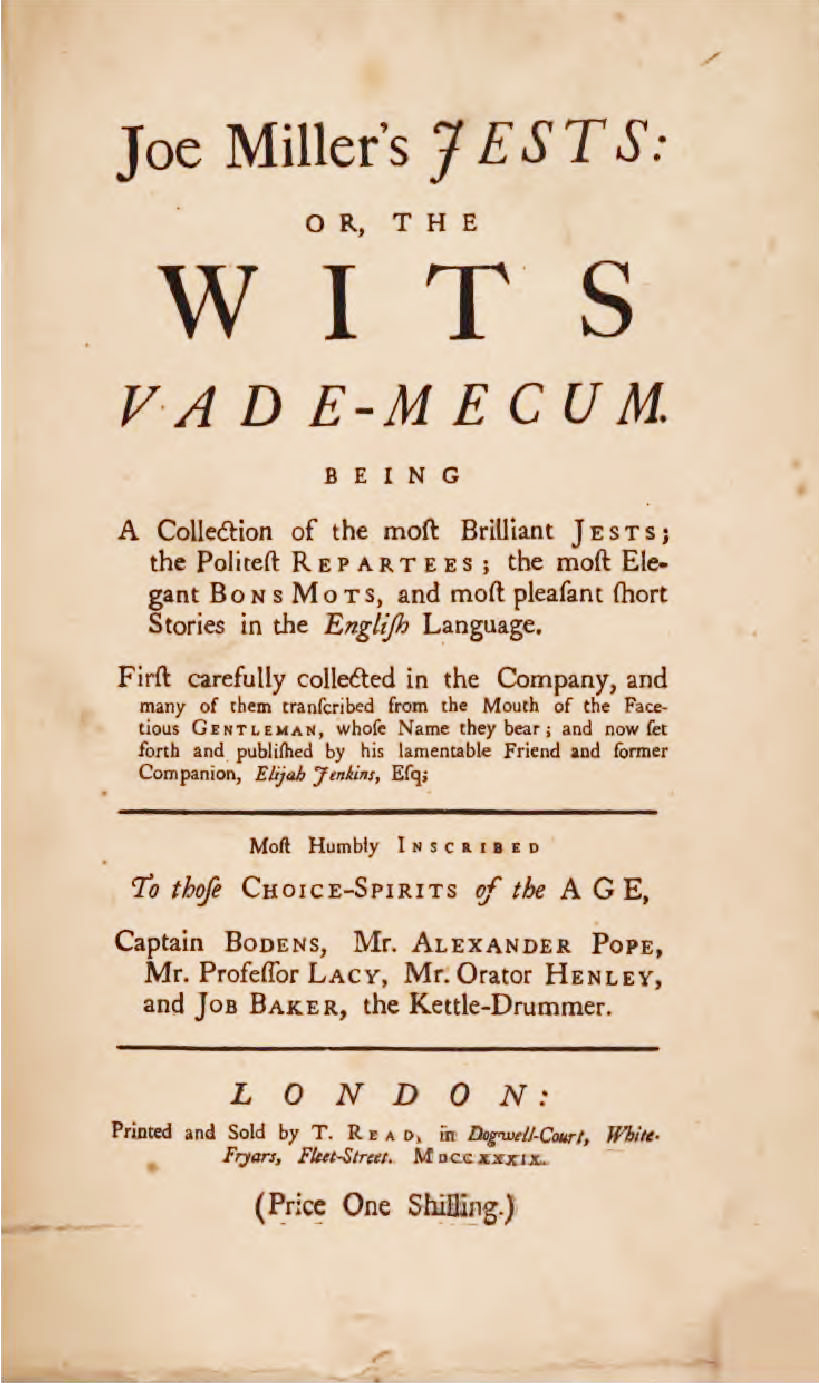 First published in London in 1739, the joke book offers 247 of the “most brilliant jests; the politest repartees; the most elegant bon mots, and most pleasant short stories in the English language,” according to the full title. The reprint duplicates the original typescript and title page down to listing the price of one shilling. The book’s compiler, John Mottley, under the nom de plume Elijah Jenkins, Esq., exploited the cachet of the recently deceased actor and comedian, Joe Miller, to sell copies.
First published in London in 1739, the joke book offers 247 of the “most brilliant jests; the politest repartees; the most elegant bon mots, and most pleasant short stories in the English language,” according to the full title. The reprint duplicates the original typescript and title page down to listing the price of one shilling. The book’s compiler, John Mottley, under the nom de plume Elijah Jenkins, Esq., exploited the cachet of the recently deceased actor and comedian, Joe Miller, to sell copies.
“The Wits Vadecum,” as it was alternatively titled, proved quite popular. A vademecum is a handbook or guide, the sort you consult so often you keep it in your purse or on the bedside table. Joe Miller’s Jests grew so well-known that a worn-out or clichéd joke was often called “a Joe Miller.” An example of a Joe Miller today would be:
Q: How do you make a tissue dance?
A: Put a little boogie in it.
Cue eye roll.
Let’s look at a few types of witticisms found in “Joe Miller’s Jests” that still elicit the odd chuckle or guffaw even today.
Fart Jokes
“When the Duke of Ormond was young and came first to Court, he happen’d to stand next to my Lady Dorchester, one Evening in the Drawing-Room, who being but little upon the Reserve on most Occasions, let a Fart, upon which he look’d her full in the Face and laugh’d. What’s the Matter, my Lord, said she : Oh! I heard it, Madam, reply’d the Duke, you’ll make a fine Courtier indeed, said she, if you mind every Thing you hear in this Place.” (5)
Puns (a.k.a. plays on words)
“One of the foresaid Gentlemen, as was his Custom, preaching most exceedingly dull to a Congregation not used to him, many of them slunk out of the Church one after another, before the Sermon was near ended. Truly, said a Gentleman present, this learned Doctor has made a very moving Discourse.” (32)
“A Beggar asking Alms under the Name of a poor Scholar, a Gentleman to whom he apply’d himself, ask’d him a Question in Latin, the Fellow, shaking his Head, said he did not understand him: Why, said the Gentleman, did you not say you were a poor Scholar? Yes, reply’d the other, a poor one indeed, Sire, for I don’t understand one Word of Latin.” (54)
“A famous Teacher of Arithmetick, who had long been married without being able to get his Wife with Child : One said to her, Madam, your Husband is an excellent Arithmetician. Yes, replies she, only he can’t multiply.” (234)
Political Humor
“Sir B—ch—r W—y, in the Beginning of Queen Anne’s Reigh, and three or four more drunken Tories, reeling home from Fountain-Tavern in the Strand, on a Sunday Morning, cry’d out, we are the Pillars of the Church, no, by G–d, said a Whig, that happened to be in their Company, you can be but Buttresses, for you never come on the Inside of it.” (60)
Fat Jokes (on par with blonde jokes and their ilk)
“Dr. Tadloe, who was a very fat Man, happened to go thump, thump, with his great Legs, thro’ a Street, in Oxford, where some Paviers had been at Work, in the Midst of July, the Fellows immediately laid down their Rammers, Ah! God bless you, Master, cries one of ‘em, it was very kind of you to come this Way, it saves us a great deal of Trouble in this hot Weather.” (66)
Religious Humor
“Michael Angelo, in his Picture of the last Judgment, in the Pope’s Chappel, painted among the Figures in Hell, that of a certain Cardinal, who was his enemy, so like that every-body knew it at first Sight : Whereupon the Cardinal complaining to Pope Clement the Seventh, of the Affront, and desiring it might be defaced : You know very well, said the Pope, I have Power to deliver a Soul out of Purgatory but not out of Hell.” (74)
Dirty Jokes
“A Country Farmer going cross his Grounds in the Dusk of the Evening, spy’d a young Fellow and a Lady, very busy near a five Bar Gate, in one of his Fields, and calling to them to know what they were about, said the young Man no Harm, Farmer, we are only going to Prop-a-Gate.” (85)
Old Age Jokes
“A Lady’s Age happening to be questioned, she affirmed she was but Forty, and call’d upon a Gentleman that was in Company for his Opinion; Cousin, said she, do you believe I am in the Right, when I say I am but Forty? I ought not to dispute it, Madam, reply’d he, for I have heard you say so these ten Years.” (99)
And my personal favorite…
Library Jokes
“A Nobleman having chosen a very illiterate Person for his Library Keeper, one said it was like a Seraglio kept by an Eunuch.” (90)
(A seraglio is another word for harem.)

Engraving of a library by Richard Bernard Godfrey, ca. 1700s. Source: Yale Center for British Art, Paul Mellon Collection.
Many “jests” referred to well-known personages and their foibles, much like modern comedians poke fun at prominent politicians and celebrities today. It was the common practice of 18th-century journalists and satirists referencing a real, living person to censor most of the name (e.g., Lord C—by) to sidestep pesky charges of libel. Contemporaries of daily newspapers and scandal sheets would have understood the allusion, while present-day readers are left to puzzle it out using historical research or just remain in the dark.
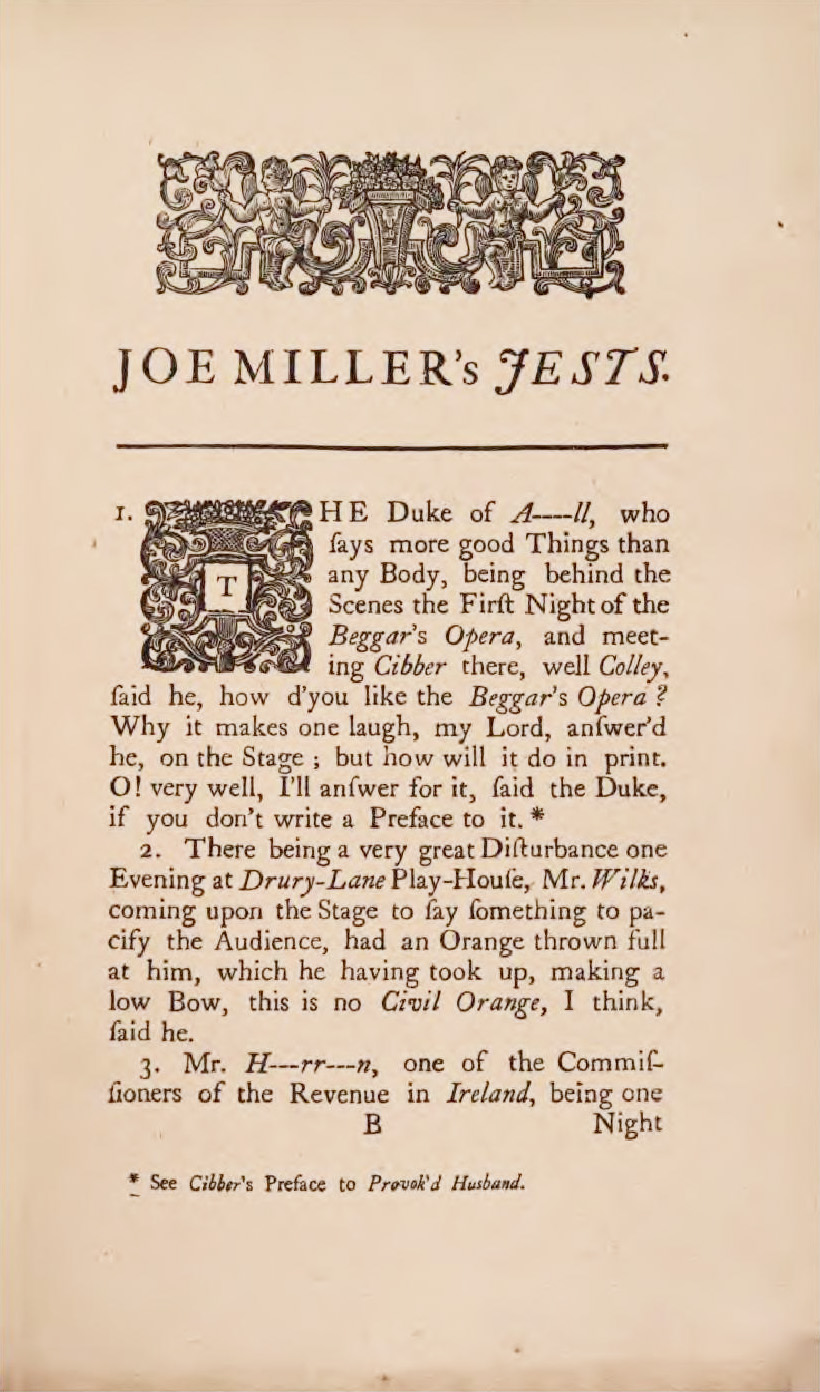
The Duke of A—ll could refer to the Duke of Argyll or the Duke of Atholl, but 18th-century readers would easily have identified the culprit.
Other jokes and anecdotes featured famous historical figures like Henry VIII, Sir Thomas More, Oliver Cromwell, Caesar Augustus and Michelangelo.
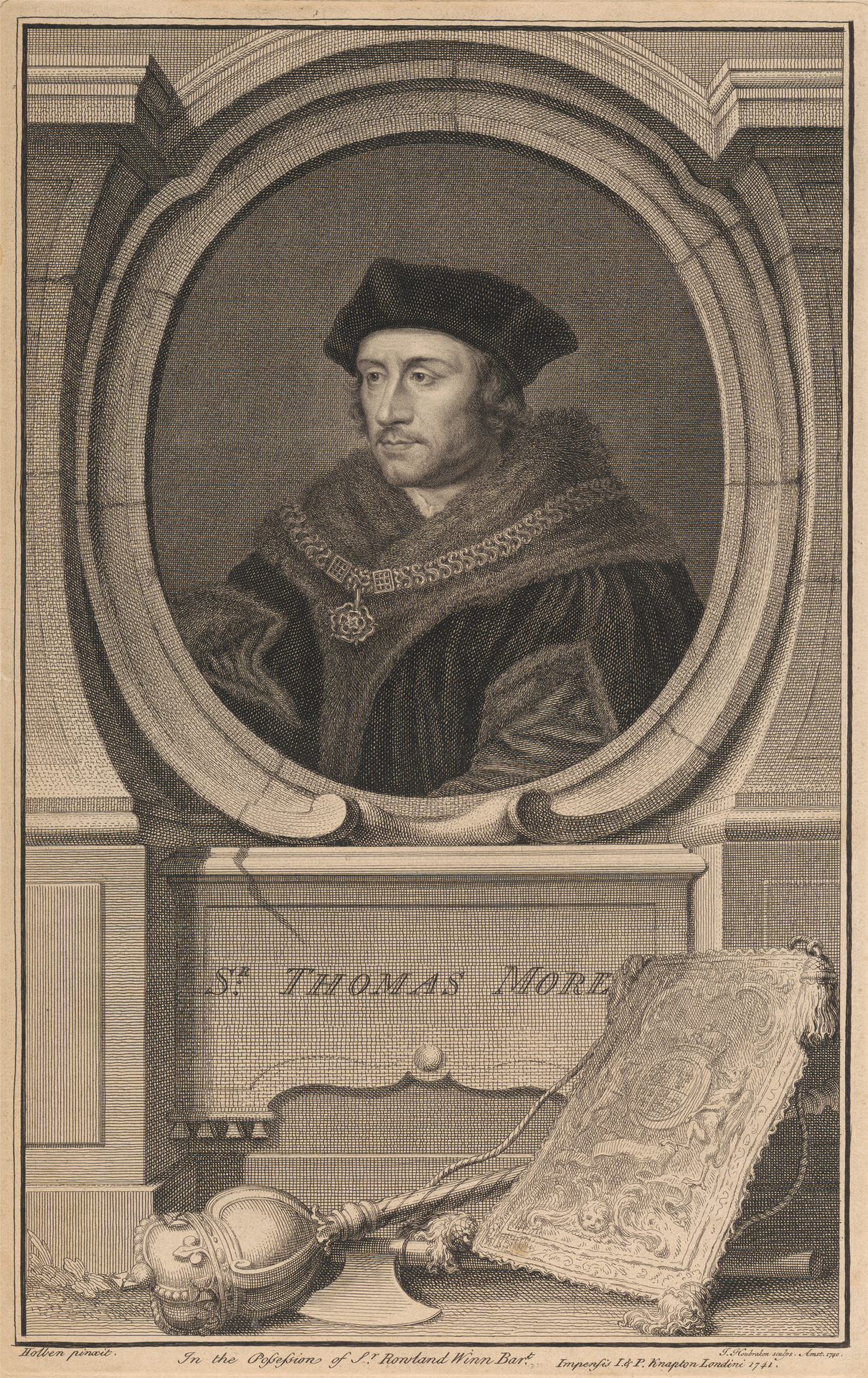
Print of Sir Thomas More by Jacobus Houbraken, 1741. Source: Yale Center for British Art; Yale University Art Gallery Collection.
Though something is lost in translation without knowledge of historical society or slang, the roots of what makes people laugh remains the same. So, maybe it’s not too surprising that “Joe Miller’s Jests” has been reprinted and republished over and over in the 278 years since its original publication.
You can read more on the continuity of humor in this piece in the New York Post.
This blog post was written by Rare Books and Manuscripts Librarian Brittany Kropf. For more information, contact the Rare Books and Manuscripts Division at (317) 232-3671 or “Ask-A-Librarian.”

